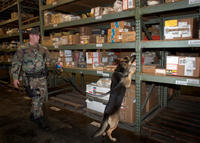-
More police departments make officers wear headcams

The Salt Lake Police Department is following other law enforcement agencies by having officers wear headgear with cameras attached; a police chief in Salt Lake is taking it one step further by announcing his intention to make the cameras mandatory at his department; this would allow police officers in Salt Lake to record any crime or interaction with the public
-
-
Soon ballistic armor may be made of wood
By processing cellulose further than has been the case to date, it is possible to extract cellulose nanocrystals (CNC) fibrils with tremendous tensile strength; since soft body armor has been available for police for about forty years, few pay attention to developments in this industry, but it was not too long ago that a plain vanilla Level II vest without a trauma plate was almost as bulky as the external body armor the military presently uses.
-
-
New smartphone app for crime tips
Howard County, Maryland police announced Monday that the department has launched a new smartphone app allowing residents anonymously to send crime tips by text, e-mail, photo, or video, according to a police news release. Howard County police are the first jurisdiction in Maryland to install the technology, which is called iWatch.
-
-
Private drone taking off in U.S.
When HobbyTown USA first began selling drones a couple years ago, they only had one or two customers inquiring about them. Now, however, with people finding real-world applications for the small pilotless aircrafts, people are coming in and asking about them much more regularly, according to Elliot.Real estate agents in the area are using drones to photograph their vineyard properties, police and fire departments are experimenting with drones for patrolling and, of course, the hobbyist is fueling the commercial push said Elliot, who added that the market is growing rapidly. He pointed out that his drone customer list has grown from one to 12 in the last two years.
-
-
Hiding communication from government, law-enforcement snooping
In response to increasing government and law-enforcement snooping, companies such as San Francisco’s Wickr are attempting to build traceless communications systems. The idea is to build the encryption into the actual message — rather than on the servers of the messaging provider — so no one other than the recipients can see what is being communicated. Right now Wickr works only on text messaging, but the company plans to extend its encryption services to e-mail and even social networks.
-
-
Police uses specially equipped tablets to nab thieves
Dayton, Ohio Police officers are using a local software company’s technology to catch thieves and are reporting some success after several years of development. Detectives launched an ongoing operation in the Oregon District this weekend that utilizes specially equipped tablets to lure and then track thieves. They made two arrests in the first twenty-four hours of the operation.
-
-
U.S. skies may soon be open to drones
Unmanned drones are cheaper than manned aircraft and can be used in a variety of ways, such as assessing environmental threats and damage from natural disaster, tracking criminals trying to escape on a highway, and assessing wildfires; according to an FAA prediction, 30,000 drones could be flying in the United States in less than twenty years; lawmakers and privacy advocates want the use of these drones more tightly regulated
-
-
Technology to help weather bushfires, floods and more
Natural disasters have increased in severity and frequency in recent years; in 2010, 385 natural disasters affected 217 million people worldwide at a cost to the global economy of $123.9 billion; there is an on-going research into digital technologies and services for disaster planning, preparation, rescue, and recovery; these technologies can help emergency services better manage natural disasters and minimize their effects on people, infrastructure, and the environment
-
-
Israel successfully tests David’s Sling mid-range missile defense system
During the just-ended Operation Pillar of Defense, Israel made military history by successfully employing a missile defense system to protect the country’s population: during the 8-day war, Hamas and Islamic Jihad launched 1,506 rockets and missiles at Israeli towns and cities; of those, 1,057 fell harmlessly in empty fields, but 449 were headed toward populated centers; of the 449, Israel’s Iron Dome system intercepted 421, and 28 hit buildings, killing five; yesterday Israel announced the successful test of David’s Sling, a mid-range missile defensive system; the system is designed to protect against missile with a range of up to 180 miles, like the missiles in the hands of Syria and Hezbollah
-
-
Improved technology to detect hazardous chemicals
Scientists have developed a system quickly to detect trace amounts of illegal drugs, explosives, pollutants in rivers, or nerve gases released into the air; the new system can pick out a single target molecule from 10,000 trillion water molecules within milliseconds, by trapping it on a self-assembling single layer of gold nanoparticles
-
-
Arizona police departments test shirt-worn, high-tech cameras
Two police departments in Arizona – Surprise and Peoria — are testing several brands of high-tech cameras that attach to an officer’s shirt; police in Mesa, Arizona used about fifty cameras for a 1-year study; the Phoenix Police Department plans on using the cameras full-time starting early next year; privacy and civil-liberties experts say the cameras can be used in a positive way, but that there needs to be a clear baseline of rules when it comes to how and when the cameras are used
-
-
New surveillance technologies for improved emergency management
Researchers are working to design and build resilient streaming sensor networks for emergency response such as bushfires; experts say the emergency services sector can significantly improve the availability of critical information better to manage incidents by exploiting new and emerging surveillance strategies
-
-
Nanotech detection device emulates dog's nose to detect explosives

Inspired by the biology of canine scent receptors, scientists develop a chip capable of quickly identifying trace amounts of vapor molecules; the chip is part of a device which is both highly sensitive to trace amounts of certain vapor molecules, and able to tell a specific substance apart from similar molecules
-
-
License plate scanners in Canada under fire from privacy commissioners
British Columbia’s privacy commissioner is not happy about the way police departments are using their license-plate scanners; in a report released last week, Commissioner Elizabeth Denham said changes must be made to the Victoria police department’s Automated License Plate Recognition Program (ALPR), after it was discovered that the program could be used as a surveillance tool
-
-
DARPA seeking surveillance technology to predict future behavior
DARPA has teamed up with scientists from Carnegie Mellon University to create an artificial intelligence system that can watch and predict what a person will “likely” do in the future, using specially programmed software designed to analyze various real-time video surveillance feeds; the system can automatically identify and notify officials if it recognized that an action is not permitted, detecting what is described as anomalous behaviors
-
More headlines
The long view
Why Was Pacific Northwest Home to So Many Serial Killers?
Ted Bundy, Gary Ridgway, George Russell, Israel Keyes, and Robert Lee Yates were serial killers who grew up in the Pacific Northwest in the shadow of smelters which spewed plumes of lead, arsenic, and cadmium into the air. As a young man, Charles Manson spent ten years at a nearby prison, where lead has seeped into the soil. The idea of a correlation between early exposure to lead and higher crime rates is not new. Fraser doesn’t explicitly support the lead-crime hypothesis, but in a nimble, haunting narrative, she argues that the connections between an unfettered pollution and violent crime warrant scrutiny.
Bookshelf: Smartphones Shape War in Hyperconnected World
The smartphone is helping to shape the conduct and representation of contemporary war. A new book argues that as an operative device, the smartphone is now “being used as a central weapon of war.”
